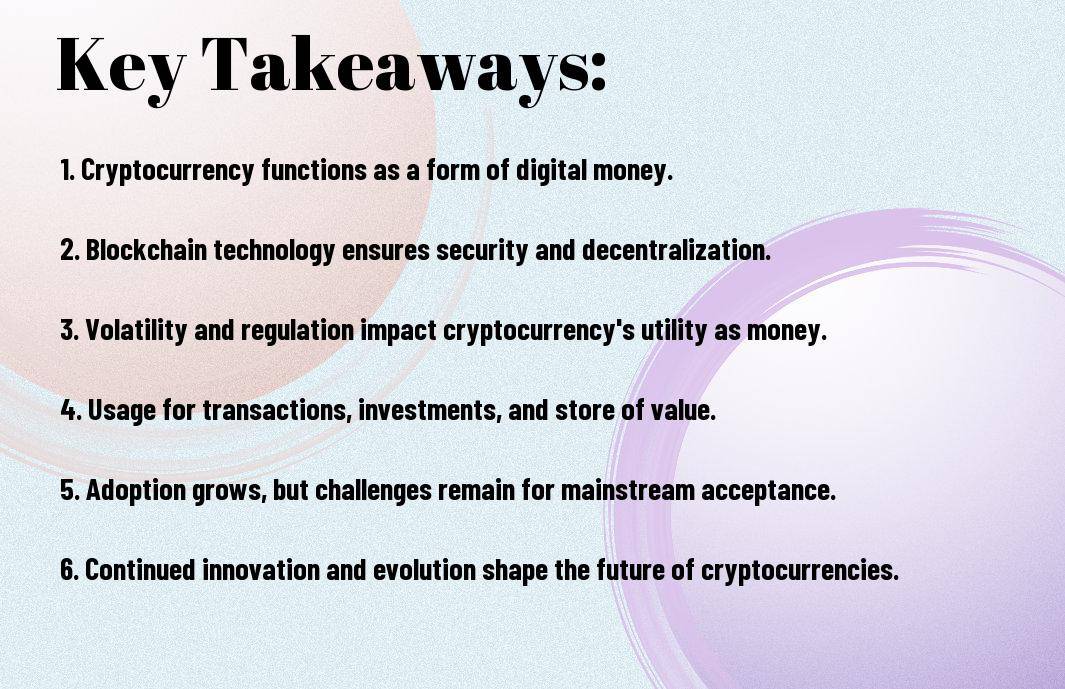Many people are still unsure about whether cryptocurrency qualifies as real money. With the rapid rise of digital currencies like Bitcoin, Ethereum, and Litecoin, it’s crucial to understand the intricacies of this evolving landscape. This blog post probes into the advantages, challenges, and future possibilities of cryptocurrency as a form of money.
Key Takeaways:
- Cryptocurrency functions as money: Despite not being physical, it can be used for transactions, store of value, and investment.
- Decentralization: Cryptocurrencies operate independently of a central bank or government, which can be both a strength and a weakness.
- Volatility: The value of cryptocurrencies can fluctuate greatly in a short period, making them risky investments.
- Security: Blockchain technology provides high levels of security, but individual accounts can still be vulnerable to hacking.
- Regulation: Governments worldwide are still developing regulations for cryptocurrencies, leading to uncertainty in the market.
- Adoption: While more businesses are accepting cryptocurrencies, widespread adoption for everyday transactions is still limited.
- Evolution: The digital currency landscape is constantly evolving, with new cryptocurrencies and technologies emerging regularly.

The History and Evolution of Cryptocurrency
The Origins of Digital Currency
Cryptocurrency, in its simplest form, is a digital or virtual form of currency that uses cryptography for security. The concept of digital currency can be traced back to the late 20th century when various attempts were made to create a decentralized digital cash system. However, it was not until the introduction of Bitcoin in 2009 by the mysterious figure, Satoshi Nakamoto, that the world saw the birth of true cryptocurrency. Bitcoin was designed to operate without the need for a central authority, allowing for peer-to-peer transactions to take place securely and anonymously.
Milestones in Cryptocurrency Development
To understand the evolution of cryptocurrency, it is important to recognize some significant milestones in its development. One of the key events was the creation of the first altcoin, Namecoin, in 2011. This paved the way for the proliferation of alternative cryptocurrencies, each with its unique features and purposes. The launch of Ethereum in 2015 marked another milestone by introducing smart contracts, enabling developers to create decentralized applications (dApps) and new tokens on its blockchain.
This journey of cryptocurrency development has not been without its challenges. From the notorious Mt. Gox hack in 2014 that resulted in the loss of millions of dollars worth of Bitcoin to the regulatory hurdles faced by the industry in various countries, the cryptocurrency landscape has been a battlefield of innovation and adversity. However, the positive impact of cryptocurrencies on financial inclusion, transparency, and decentralization cannot be overlooked. The continuous evolution and adaptation of cryptocurrencies suggest a promising future for digital currency in reshaping the global financial ecosystem.
Understanding Money: Characteristics and Functions
Traditional Definitions of Money
Money has been a fundamental part of human societies for centuries, serving as a medium of exchange, a unit of account, and a store of value. According to traditional definitions, money must possess certain characteristics to function effectively. These include durability, divisibility, portability, uniformity, limited supply, and acceptability.
How Cryptocurrency Measures Up
To understand how cryptocurrency measures up as a form of money, we can assess its characteristics against the traditional standards. While cryptocurrency surpasses in durability and divisibility due to its digital nature and cryptographic design, challenges arise in terms of acceptability and limited supply. The decentralized nature of cryptocurrencies poses both risks and opportunities in terms of their widespread adoption and stability as a medium of exchange.
Definitions: The concept of money is evolving with the rise of cryptocurrencies, challenging traditional norms and structures. It is imperative to critically analyze how these digital currencies align with the core functions of money and their implications for the future of financial systems.

Cryptocurrency Versus Fiat Currency
To A New Era of Digital Money – IMF F&D, the rise of cryptocurrencies has challenged the traditional notion of fiat currency. While fiat currency is issued and regulated by governments, cryptocurrencies operate on decentralized networks using blockchain technology. One of the key differences between the two is the level of control and regulation. Fiat currency is backed by governments, central banks, and legal frameworks, while cryptocurrencies operate independently of any centralized authority.
Differences in Properties and Usage
The properties and usage of cryptocurrencies differ significantly from fiat currency. Cryptocurrencies are typically digital and decentralized, offering users anonymity and security in their transactions. On the other hand, fiat currency exists in physical form as cash and is regulated by central authorities. Cryptocurrencies are also borderless and can be transferred globally with minimal fees and restrictions, unlike fiat currency which is subject to international banking regulations and exchange rates.
Advantages and Disadvantages of Cryptocurrencies
Any discussion on cryptocurrencies must consider their advantages and disadvantages. One of the key advantages of cryptocurrencies is the anonymity they offer, allowing users to make transactions without revealing their identities. Additionally, the security of blockchain technology provides protection against fraud and hacking, making cryptocurrencies a relatively safe form of digital assets. However, one of the main disadvantages is the volatility of the cryptocurrency market, leading to uncertainty and risk for investors. Moreover, the lack of regulation and oversight can make cryptocurrencies vulnerable to misuse and criminal activities.
It is imperative to carefully weigh the pros and cons of cryptocurrencies before engaging in transactions or investments to make informed decisions in this evolving digital currency landscape.
The Value of Cryptocurrency
Unlike traditional fiat currencies, the value of cryptocurrencies is not backed by a physical commodity like gold or government regulation. Instead, the value of cryptocurrency is determined by market demand and supply dynamics. This decentralized nature allows for greater volatility in pricing, as well as the potential for significant price fluctuations.
Factors Influencing Cryptocurrency Value
- Market Demand: The prices of cryptocurrencies are heavily influenced by the level of demand from investors and traders. Positive news, regulatory developments, and adoption by mainstream businesses can all drive up demand and consequently increase the value of cryptocurrencies.
- Scarcity: The limited supply of many cryptocurrencies, such as Bitcoin, contributes to their value. With a predetermined maximum supply, scarcity can drive up prices as more people seek to acquire them.
Any sudden changes in regulations, security breaches, or market sentiments can lead to rapid price fluctuations in the cryptocurrency market.
Cryptocurrency as a Store of Value
For many investors, cryptocurrency serves as a store of value due to its decentralized nature and potential for long-term growth. Unlike fiat currencies that can be subject to inflation and government manipulation, cryptocurrencies offer a hedge against economic uncertainties.
Factors such as limited supply, increasing adoption by mainstream institutions, and the growing recognition of its utility as a digital asset contribute to the appeal of cryptocurrency as a store of value. Investors looking to diversify their portfolio and mitigate risks often turn to cryptocurrencies as a strategic investment.
Legal and Regulatory Perspectives
Global Regulatory Stances on Cryptocurrency
Many countries around the world are grappling with how to regulate cryptocurrencies in a rapidly evolving digital landscape. Regulatory approaches vary widely, from outright bans to embracing digital currencies as a legitimate form of payment. Some major financial centers like the United States, United Kingdom, and Japan have introduced regulatory frameworks to govern the use of cryptocurrencies, aiming to strike a balance between innovation and consumer protection.
China’s firm stance against cryptocurrency trading and Initial Coin Offerings (ICOs) has prompted a massive shift of trading activities to more crypto-friendly jurisdictions. On the other hand, Switzerland and Malta have positioned themselves as crypto-friendly havens, attracting businesses and investors seeking regulatory clarity and a supportive environment.
Implications of Legal Recognition
With the growing acceptance of cryptocurrency as a legal means of exchange, businesses and consumers can benefit from increased legitimacy and mainstream adoption of digital currencies. Legal recognition also provides a level of consumer protection and recourse in case of disputes or fraudulent activities involving cryptocurrencies. However, regulatory compliance requirements can pose challenges for businesses operating in multiple jurisdictions, as each country may have its own set of rules and reporting obligations.
Stances on cryptocurrency regulation continue to evolve as governments and regulatory bodies grapple with the potential risks and rewards of digital currencies. It is crucial for stakeholders to stay informed and adapt to the changing regulatory landscape to ensure compliance and foster innovation in the digital currency space.

Cryptocurrency in Commerce and Investment
Now, as cryptocurrency continues to make waves in the financial world, it is imperative to explore into its role in commerce and investment. The adoption and integration of digital currencies by businesses and consumers have reshaped traditional notions of money and investment.
Adoption by Businesses and Consumers
Consumers are increasingly embracing the use of cryptocurrencies in their daily transactions. Major companies like Microsoft, Tesla, and Overstock now accept Bitcoin and other digital currencies as a form of payment. This shift towards mainstream acceptance has incentivized consumers to explore the benefits of fast and secure transactions offered by cryptocurrencies.
Cryptocurrency Investment Landscape
Adoption of cryptocurrency for investment purposes has grown significantly in recent years. Investors are attracted to the potential for high returns and the decentralization of digital assets. Platforms like Coinbase and Binance have made it easier for individuals to buy, sell, and trade a wide range of cryptocurrencies.
Investment in cryptocurrency comes with both opportunities and risks. The market’s volatility can lead to quick gains or substantial losses. It is crucial for investors to conduct thorough research and understand the market dynamics before venturing into the world of digital currency investment.
Challenges and Risks of Cryptocurrency as Real Money
Security and Fraud Concerns
Risks surrounding security and fraud are major challenges when considering cryptocurrency as real money. The decentralized nature of cryptocurrencies and the anonymity they offer make them attractive to cybercriminals. Hacking incidents, phishing scams, and fraudulent ICOs (Initial Coin Offerings) have resulted in millions of dollars in losses for investors and users. With transactions being irreversible and difficult to trace, recovering stolen funds is nearly impossible, leaving individuals vulnerable to financial loss.
Volatility and Its Impact on Adoption
Any discussion about the adoption of cryptocurrency as real money must address the issue of volatility. The unpredictable price fluctuations of cryptocurrencies like Bitcoin can deter consumers and businesses from using them as a stable medium of exchange. The value of a cryptocurrency can experience significant fluctuations within a short period, making it challenging for everyday transactions and long-term financial planning.
Volatility in the cryptocurrency market can be both a boon and a bane. While it offers opportunities for traders to profit from price swings, it also poses a significant risk for those holding cryptocurrencies for everyday use. Without a stable value, cryptocurrencies may struggle to gain widespread acceptance as a reliable form of money for regular transactions.

Future of Cryptocurrency
Once again, the future of cryptocurrency holds great promise and potential for further growth and innovation. To better understand where cryptocurrency is heading, it’s imperative to investigate into the latest trends and developments in the digital currency landscape. If you’re new to the world of cryptocurrency, I recommend checking out this Cryptocurrency Explained With Pros and Cons for Investment guide.
Technological Innovations and Trends
With the rapid advancement of technology, cryptocurrency is set to experience significant innovations and trends. One notable trend is the rise of decentralized finance (DeFi) platforms, which offer traditional financial services using blockchain technology. Additionally, the development of central bank digital currencies (CBDCs) by various governments around the world is poised to reshape the monetary landscape.
Potential for Mainstream Adoption
With the increasing acceptance and adoption of cryptocurrencies by both individuals and institutional investors, the potential for mainstream adoption is becoming more apparent. Major financial institutions are starting to recognize the value of digital assets, with some even integrating cryptocurrency services into their offerings. The convenience, security, and transparency offered by blockchain technology make cryptocurrencies a viable alternative to traditional forms of payment and investment.
Understanding the technological innovations and potential for mainstream adoption in the cryptocurrency space is crucial for both seasoned investors and newcomers. While the risks and volatility associated with digital currencies are still present, the positive aspects such as financial inclusion, borderless transactions, and decentralized systems cannot be ignored. It is imperative to stay informed and cautious in navigating the evolving landscape of cryptocurrency.
To wrap up
As a reminder, the concept of cryptocurrency has rapidly gained prominence in the financial world, offering new opportunities for digital transactions and investments. While it exhibits characteristics of real money such as being a medium of exchange and store of value, there are still debates and uncertainties surrounding its classification as legal tender. Despite this, the increasing acceptance and adoption of cryptocurrencies indicate a significant shift towards embracing digital forms of currency in the modern economy.
While the digital currency landscape continues to evolve, it is important to stay informed and educated about the potential risks and benefits associated with cryptocurrencies. As technology advances and regulations develop, the role of cryptocurrencies in the financial system may become more defined. Whether or not cryptocurrency is considered real money, its impact on the way we perceive and utilize currency is undeniable, and it will be fascinating to observe how this space continues to unfold in the future.
FAQ
Q: What is cryptocurrency?
A: Cryptocurrency is a type of digital or virtual currency that uses cryptography for security. It operates independently of a central authority, such as a government or financial institution.
Q: How does cryptocurrency work?
A: Cryptocurrency transactions are recorded on a decentralized digital ledger called a blockchain. Participants in the network use computers to validate and secure transactions through a process known as mining.
Q: Is cryptocurrency considered real money?
A: While cryptocurrency does not have physical form, it can be used as a medium of exchange and store of value, similar to traditional fiat currencies. Therefore, many people consider it to be a form of real money.
Q: What are the advantages of using cryptocurrency?
A: Cryptocurrency offers benefits such as lower transaction fees, faster cross-border transactions, increased privacy, security, and transparency, and accessibility to the unbanked population.
Q: Are there any risks associated with cryptocurrency?
A: Yes, risks include price volatility, regulatory uncertainties, security threats such as hacking and scams, lack of consumer protection, and the potential for illegal activities such as money laundering.
Q: How can someone acquire cryptocurrency?
A: Cryptocurrency can be acquired through various means, such as purchasing on cryptocurrency exchanges, receiving it as payment for goods or services, mining, or earning through activities like staking or airdrops.
Q: What is the future outlook for cryptocurrency?
A: The future of cryptocurrency is uncertain, but many experts believe that digital currencies will continue to gain mainstream adoption, leading to innovations in financial services and technology. Regulatory developments will also play a crucial role in shaping the future of cryptocurrency.



